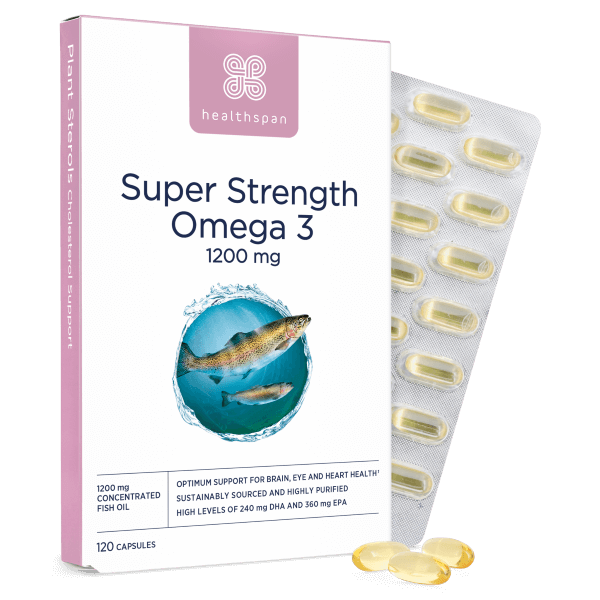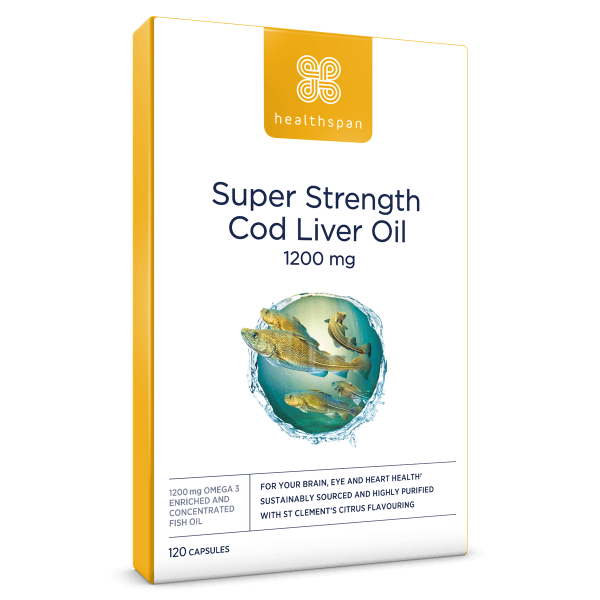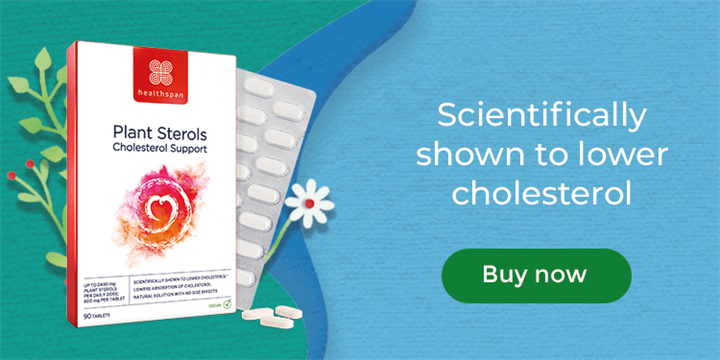Cod liver oil and omega 3s are among the most popular food supplements, but how do they differ and how do you choose the right one for you?
🕒 6 min read
The important thing to know is that both supplements provide omega-3 fatty acids, so we'll start with these first.
What is omega 3?
Omega 3 is a type of fatty acid that's vital for health – but not all omega 3s are the same. They come in a variety of sizes with different chain lengths, and it's the beneficial, long-chain omega 3s – DHA and EPA – that are found in fish oil supplements.
These fatty acids are extracted from the flesh of oily fish such as salmon and, increasingly, from vegetarian sources such as marine algae: where oily fish obtain omega 3s in the first place.
What is cod liver oil?
Cod liver oil, as its name suggests, is extracted from the liver of cod. As a result, cod liver oil supplies the long-chain omega 3s EPA and DHA, as well as the two fat-soluble vitamins that cod store in their liver – vitamins A and D3.
Cod liver oil supplements therefore offer all the benefits of omega-3 fish oil supplements with the added bonus of additional micronutrients for those who need them.
Omega 3 benefits
Brain health
The DHA form of omega 3 is important for making healthy nerve cells, including those found in the brain and in the back of the eye. Its close relative, EPA, plays an important role in cell communication and in suppressing inflammation.
These two fatty acids are so important for brain health that people who eat the most fish and obtain the most DHA and EPA appear to be 22% less likely to develop depression than those who eat the least.1
Eye health
Although DHA is important for eye development, it also helps to protect against the progression of age-related macular degeneration – a common cause of vision loss in later life.2
Heart health
When it comes to the heart and circulation, omega 3s have beneficial effects on blood pressure and blood stickiness, and help to lower abnormally high levels of triglyceride fats. They may also protect against certain abnormal heart rhythms, especially in heart muscle that's receiving a poor blood supply.3
Having reviewed all the research evidence, the EU has approved health claims that DHA is important for healthy brain function and for maintaining normal vision, while both DHA and EPA help to maintain normal blood pressure and triglyceride levels, as well as contributing to the normal function of the heart.4
Many people find that omega 3 is beneficial for their joints, too. This may be as a result of its anti-inflammatory effects, although there are currently no authorised health claims around this potential benefit.

Super Strength Omega 3 1,200mg
Highly concentrated, refined and sustainably sourced omega-3 fatty acids
- 240mg DHA and 360mg EPA
- Anti-inflammatory; supports brain, eye and heart health
- Benefits of oily fish for 15c a day
Cod liver oil benefits
As mentioned above, cod liver oil has the same benefits as omega 3 – but also has the benefits of vitamins A and D.
What is vitamin A good for?
Vitamin A is a powerful antioxidant that plays a role in vision and in the growth and repair of tissues. The retinol form of vitamin A, which is found in cod liver oil, helps to maintain healthy eyes and is needed for the production of the light-sensitive pigment, rhodopsin (visual purple).
Studies involving almost 89,000 people show that good intakes of omega 3 reduce the risk of visual loss due to age-related macular degeneration.5
What is vitamin D good for?
Cod liver oil is a rich source of vitamin D3, which is vital for the absorption of calcium and phosphate to strengthen bones. Low intakes of vitamin D increase the risk of the bone disease rickets in children, and of osteomalacia (softening of the bones) and osteoporosis (brittle bones) in adults.
A study in Aberdeen showed that the risk of vitamin D deficiency was significantly lower among women who took cod liver oil supplements compared to those who did not take them.6
Vitamin D also has beneficial effects on immunity and brain health. In fact, omega 3 and vitamin D may work together to help regulate levels of serotonin – the so-called 'happy' neurotransmitter in the brain.7
Cod liver oil supplements
Cod liver oil is one of the most popular supplements, with a long history of use. During and after World War II, cod liver oil was distributed by the Ministry of Food to ensure that all children and adults were getting enough vitamin A and D at the time of food rationing.8
Many parents still choose to give their children cod liver oil which, thanks to modern production techniques and natural flavourings, tends to taste a lot more pleasant than it used to. Cod liver oil is available as capsules, liquids or even flavoured jelly-like chews.
What do the studies say?
In a study of people with rheumatoid arthritis, after nine months of use cod liver oil supplements were found to reduce the number of non-steroidal anti-inflammatory painkillers taken by over 30%.9
In another piece of research, children who were prescribed cod liver oil and multivitamin supplements by paediatricians in the US needed significantly fewer clinic visits for upper respiratory tract infections than those not given the supplements.10

Super Strength Cod Liver Oil 1,200mg
One of the highest strength cod liver oil supplements available
- Rich source of DHA and EPA
- Supports heart, brain and eye health
- Added calcium to support bone health
Cod liver oil is one of the most popular supplements, with a long history of use. During and after World War II, cod liver oil was distributed by the Ministry of Food to ensure that all children and adults were getting enough vitamin A and D at the time of food rationing.8
Many parents still choose to give their children cod liver oil which, thanks to modern production techniques and natural flavourings, tends to taste a lot more pleasant than it used to. Cod liver oil is available as capsules, liquids or even flavoured jelly-like chews.
What do the studies say?
In a study of people with rheumatoid arthritis, after nine months of use cod liver oil supplements were found to reduce the number of non-steroidal anti-inflammatory painkillers taken by over 30%.9
In another piece of research, children who were prescribed cod liver oil and multivitamin supplements by paediatricians in the US needed significantly fewer clinic visits for upper respiratory tract infections than those not given the supplements.10
Choosing between fish oils: which is right for you?
If you don't eat at least two portions of fish per week, of which one is oily, a supplement is a good alternative, especially as fish oils are purified and distilled to remove deep sea pollutants.
Which form you choose comes down to personal preference, although there are some key differences between them.
- Cod liver oil provides the long-chain omega 3s, DHA and EPA, plus vitamins A and D. A good-quality cod liver oil will be sustainably sourced and typically offers around 560mg DHA and 370mg EPA per 5ml dose, plus 10mcg vitamin D3, 250mcg vitamin A and vitamin E as a natural preservative.
- Fish oil from the flesh of oily fish such as salmon provides omega 3s – typically around 240mg DHA and 360mg EPA, with added vitamin E per capsule.
- Krill oil provides a lower amount of omega 3s (typically around 77mg DHA and 149mg EPA) per capsule, but also contains two powerful antioxidant pigments: astaxanthin and canthaxanthin, which give it an attractive red colour. Flavourings such as vanilla are often added.
- Algae oil provides EPA and DHA from marine plant-based sources. A typical capsule containing 1,000mg algae oil can deliver as much as 340mg DHA and 170mg EPA.
If you have difficulty swallowing capsules, chewable fish oil jellies and liquid omega 3 fish oils flavoured with citrus oils are available. If you haven't tried cod liver oil for a while, you may be pleasantly surprised at how pleasant it can taste, with some products having won international taste awards.
Are there any watchpoints?
Do not take cod liver oil during pregnancy as excess vitamin A can be harmful to a developing baby.
If you are on medication, always check with a doctor before taking supplements.
Do not take if allergic to fish.






